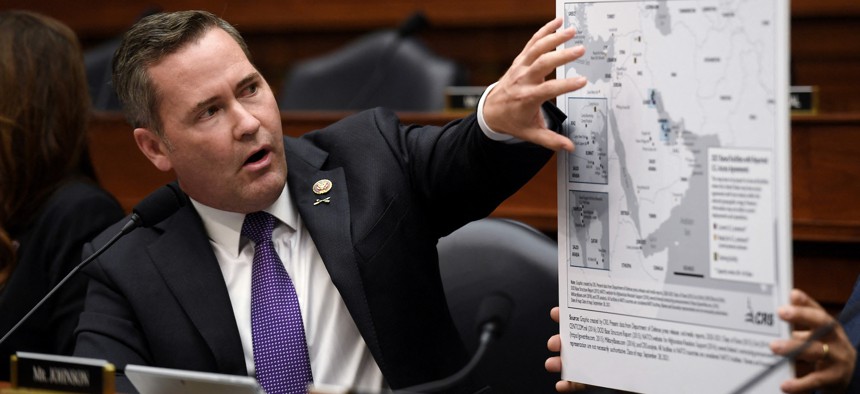
Rep. Michael Waltz, R-Fla., shown here at a 2021 committee hearing, is seeking limits on genetic data available to foreign researchers. Olivier Douliery/AFP via Getty Images
Research institutions must better secure sensitive data from foreign adversaries, experts say
To prevent foreign nations from gaining access to sensitive research data, U.S. institutions need to “have a higher sense of internal security” when it comes to protecting critical information.
U.S. universities and research institutions need to be more protective of their sensitive data and have a better sense of the foreign governments underwriting their work to prevent it from falling into the hands of adversarial nations, a key House lawmaker and other experts said during a Hudson Institute event on Monday.
Rep. Mike Waltz, R-Fla., a member of the House Intelligence Committee, noted that the U.S. and United Kingdom “currently allow foreign researchers to access genetic material from our citizens to be collected in certain commercial products and processes like prenatal care.”
“Obviously, the People's Republic of China sees value in the personally identifying information, genetically identifying information [of Americans],” he added. “But that can be used, obviously, against us in a tremendous way, particularly with the onset of AI.”
Miles Yu — a senior fellow at the Hudson Institute and the director of the conservative think tank’s China Center — said institutions should not view everyone within their ranks as a potential spy and that data should often remain open source, but added that institutions must also “have a higher sense of internal security.”
“In other words, what is considered national security information has to be guarded very, very carefully,” he said. “So in terms of employment of foreign nationals, we have existing laws; those laws must be strengthened. And the vetting process has to be very, very rigorous.”
But Waltz expressed concern that enhanced vetting standards alone wouldn’t be enough to safeguard sensitive data, warning of the ways in which hostile nations may threaten young researchers’ families back home if they do not provide them with such information.
“I’m still not sure how we deal with that,” Waltz said, adding that “if we vet up front and then they’re leveraged later,” it could still jeopardize sensitive data.
He also noted that representatives from research institutions he’s met with — including those “that are doing critical research in advanced materials” — have stressed that they need access to high-skilled talent and need those individuals to remain in the U.S. More restrictive limits on foreign nationals working in these positions could serve to curtail institutions’ research efforts.
But Waltz and the panel’s experts highlighted that enhanced transparency around the ties between academic institutions and foreign governments has been a point of progress.
Waltz said that, “in an effort toward transparency,” the CHIPS and Science Act signed into law last year increased the size of the National Science Foundation’s security office from one staffer to five.
NSF provides significant grant funding to universities and research institutions in all 50 states and U.S. territories, and Waltz said the enhanced security office team will help “increase the tools” at the agency’s disposal when it comes to reviewing any potential risks.
Craig Singleton — a senior fellow at the Foundation for the Defense of Democracies and its China Program deputy director — also pointed to House passage of the DETERRENT Act on Dec. 6, which would require universities and staff and faculty at research institutions to enhance their disclosure of foreign gifts and investments.
“We really need to understand these opaque research partnerships that exist because we're increasingly seeing that those joint collaborations have resulted in direct contributions to military civil fusion,” Singleton said.







